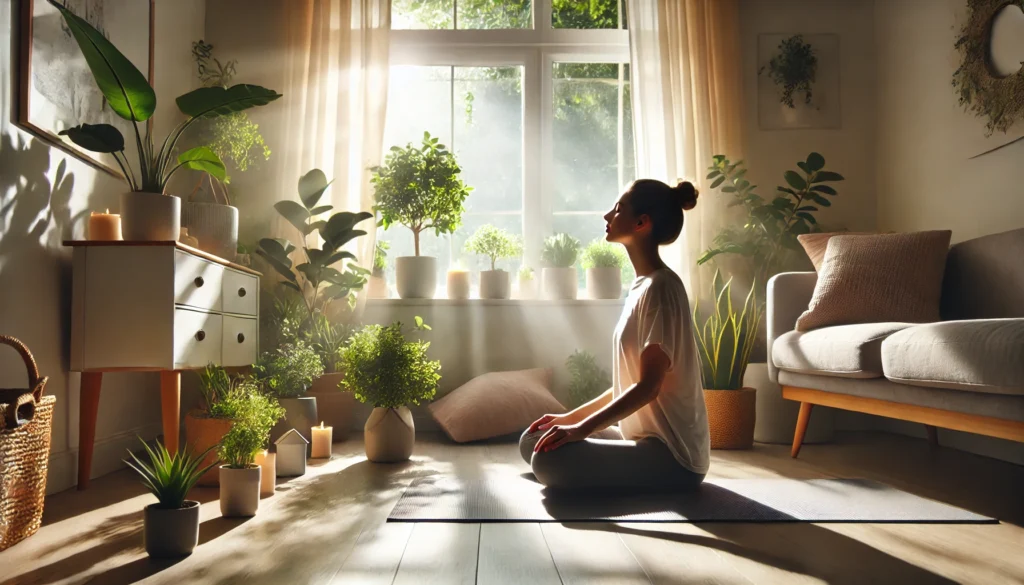Anxiety is one of the most common mental health challenges affecting individuals across all walks of life. Yet, the approach to managing this pervasive condition often centers around pharmaceutical intervention. While medications can be effective for some, they are not the only option—and for many, they are not the preferred one. Whether due to concerns about side effects, long-term dependency, or a desire for a more holistic lifestyle, a growing number of individuals are seeking out ways to manage anxiety without drugs. This article delves into the science, strategies, and lived experience behind learning how to manage anxiety without medication, offering an in-depth look at how natural, evidence-based approaches can provide meaningful relief and foster long-term resilience.
You may also like: Proven Relaxation Techniques for Stress and Anxiety: Evidence-Based Strategies to Calm Your Mind and Body
Understanding the Nature of Anxiety and Why It Feels Overwhelming
To understand how to treat anxiety without medication, it’s essential to first explore the nature of anxiety itself. Anxiety is not simply nervousness or stress; it is a complex interaction of cognitive, emotional, and physiological responses to perceived threats. This could be a real situation—like a looming deadline—or a perceived one, such as catastrophic thinking or rumination. In individuals with anxiety disorders, this response is disproportionate, persistent, and often debilitating. It disrupts daily life, interferes with relationships, and diminishes quality of life.
One of the reasons anxiety can feel so overwhelming is due to its effect on the nervous system. The body’s stress response—commonly referred to as the “fight or flight” mechanism—is activated, flooding the body with cortisol and adrenaline. This leads to a cascade of physical symptoms, including rapid heartbeat, shortness of breath, dizziness, and gastrointestinal distress. Over time, this constant state of arousal can wear down the body and mind, contributing to fatigue, irritability, and difficulty concentrating. Recognizing these biological underpinnings is crucial for anyone exploring how to deal with anxiety without medication, as it highlights the need for techniques that soothe the nervous system.
Why People Are Seeking Anxiety Treatment Without Medication
The decision to pursue anxiety treatment without medication is often motivated by a combination of personal values, past experiences, and a desire for autonomy in mental health care. Some individuals experience adverse effects from medications such as selective serotonin reuptake inhibitors (SSRIs), including weight gain, sexual dysfunction, and emotional blunting. Others may have tried medications without achieving meaningful relief or felt that the drugs treated symptoms but not the root cause.
Moreover, there is a growing cultural shift toward integrative health practices that prioritize the mind-body connection and emphasize lifestyle changes. This has led to increased interest in how to control anxiety attacks without medication and how to sustain long-term emotional wellness through natural means. For many, learning how to get rid of anxiety forever—without reliance on pills—is not only a goal but a personal journey toward self-empowerment.
The Science Behind Natural, Non-Pharmaceutical Anxiety Treatments
Non-pharmaceutical anxiety treatment strategies are not based on wishful thinking or placebo effects. Rather, they are rooted in neuroscience, behavioral psychology, and clinical research. Practices like mindfulness meditation, aerobic exercise, and breathwork have been shown to change brain activity, increase gray matter in regions associated with emotional regulation, and reduce inflammation—all of which are relevant to anxiety management.
Cognitive Behavioral Therapy (CBT), often regarded as the gold standard in psychotherapy, has been validated across numerous studies as one of the most effective treatments for anxiety disorders. CBT helps individuals challenge distorted thought patterns, identify behavioral triggers, and develop healthier coping strategies. Importantly, CBT has demonstrated efficacy both with and without concurrent medication use, making it a cornerstone for those exploring anxiety disorder treatment without medication.
Similarly, emerging fields like psychoneuroimmunology—examining the interaction between psychological processes and the immune system—have further validated the role of lifestyle interventions in mental health. Nutritional psychiatry, for example, underscores how gut health and dietary patterns influence mood, anxiety, and cognition. These scientific advancements strengthen the case for managing anxiety without drugs by showing how the body and brain respond to holistic interventions.

Harnessing the Power of Mindfulness and Meditation
Mindfulness practices have gained widespread popularity in recent years, and for good reason. The practice of staying present and observing thoughts without judgment has been shown to reduce anxiety symptoms and improve emotional resilience. Numerous studies have found that mindfulness-based interventions (MBIs), including Mindfulness-Based Stress Reduction (MBSR), significantly reduce symptoms in individuals with generalized anxiety disorder (GAD), panic disorder, and social anxiety.
Meditation helps by altering activity in the default mode network (DMN), the brain system responsible for self-referential thinking and rumination. Since rumination is a hallmark of anxiety, reducing DMN activity can bring considerable relief. Meditation also activates the parasympathetic nervous system, lowering heart rate, improving breathing, and reducing cortisol levels. This biological shift makes mindfulness a powerful tool for those seeking anxiety treatment without drugs.
Crucially, mindfulness does not require hours of sitting in silence. Short, daily practices—such as five-minute breath awareness or body scans—can yield meaningful benefits over time. This makes it accessible for individuals at any stage in their journey toward learning how to cope with anxiety without medication.
The Role of Deep Breathing and Breathwork in Anxiety Regulation
One of the most immediate ways to calm anxiety without pills is to focus on the breath. Breathwork refers to conscious control of breathing patterns to influence physical, mental, and emotional states. This is not just anecdotal; scientific studies have demonstrated that slow, diaphragmatic breathing activates the vagus nerve, which in turn stimulates the parasympathetic nervous system.
This biological response helps counteract the fight-or-flight reaction and initiates a relaxation response. Techniques such as box breathing, 4-7-8 breathing, and coherent breathing have been shown to improve heart rate variability (HRV), a key marker of nervous system flexibility and emotional resilience. These methods are particularly useful for people wondering how to control anxiety attacks without medication, as they can be employed in real-time when symptoms spike.
Moreover, breathwork is non-invasive, free, and available to anyone, making it a cornerstone of non-pharmaceutical anxiety treatment. With regular practice, individuals can recondition their autonomic nervous system to be less reactive to stress, contributing to long-term emotional regulation and greater mental clarity.

Frequently Asked Questions: Natural and Evidence-Based Ways to Treat Anxiety Without Medication
1. Can anxiety really be managed effectively without medication?
Yes, it is entirely possible to manage anxiety without medication, and many people have done so successfully. While pharmaceuticals can be useful for some, natural methods offer long-term benefits without side effects. Understanding how to manage anxiety without medication involves cultivating habits that regulate your nervous system, reduce inflammation, and promote psychological flexibility. Techniques like cognitive restructuring, lifestyle changes, and consistent practice of mindfulness can significantly reduce symptoms. These methods not only help manage anxiety without drugs but also contribute to improved overall well-being.
2. How can someone know which non-pharmaceutical anxiety treatment will work best for them?
Choosing a natural treatment depends on personal preferences, the severity of symptoms, and lifestyle factors. Some individuals may respond better to structured therapies like CBT, while others find that body-centered approaches like yoga or breathwork resonate more deeply. A trial-and-error period is common when exploring how to treat anxiety without medicine, so patience is key. Journaling your experiences and working with a mental health professional who specializes in holistic care can help tailor an approach. Ultimately, those interested in anxiety disorder treatment without medication should remain open to adjusting strategies as they learn what works best for their unique physiology and mindset.
3. What role does diet play in reducing anxiety without medication?
Dietary patterns can have a profound impact on mental health through the gut-brain axis. Research shows that diets high in sugar, refined carbs, and processed foods can worsen anxiety symptoms, whereas whole-food, anti-inflammatory diets support emotional balance. Nutrients such as magnesium, omega-3 fatty acids, and B-vitamins play a critical role in neurotransmitter synthesis. For those exploring how to cure anxiety without pills, optimizing nutrition can be a powerful foundation. Incorporating fermented foods, leafy greens, and healthy fats is a proactive step toward anxiety treatment without medication.
4. Are there any emerging therapies for anxiety that don’t involve drugs?
Yes, several innovative and evidence-based therapies are gaining traction. Neurofeedback, for example, uses real-time EEG monitoring to train the brain toward calmer states. Virtual reality exposure therapy offers immersive experiences to desensitize anxiety triggers in a controlled setting. Additionally, somatic experiencing—a body-focused therapy—has gained attention for its ability to release trauma and regulate the nervous system. These options are promising for individuals seeking anxiety treatment without drugs, especially when conventional talk therapy has not been sufficient. As technology evolves, more options are becoming available for those who want to reduce anxiety without medication.
5. How can people support a loved one who wants to manage anxiety without drugs?
Support starts with listening and validating their choice to explore natural options. Avoid pressuring them to take medication if they’re committed to discovering how to treat anxiety without medication. Instead, offer practical help like attending therapy appointments with them, participating in calming activities together, or researching local support groups. Encouragement can also come through engaging in shared practices such as meditation or nature walks, both of which can strengthen social bonds and emotional resilience. The journey of living with anxiety is easier when loved ones foster a compassionate, nonjudgmental environment.
6. Can physical activity really be as effective as medication for anxiety?
In many cases, yes—particularly for mild to moderate anxiety. Exercise stimulates the release of endorphins, dopamine, and serotonin, which are essential for mood regulation. It also reduces cortisol levels and improves sleep quality, both of which are vital for long-term anxiety management. For those wondering how to get rid of anxiety forever, committing to regular movement—whether through aerobic workouts, tai chi, or strength training—can be a transformative part of the plan. Incorporating physical activity is a core element in how to deal with anxiety without medication, offering both mental and physical benefits.
7. What does long-term success look like when using natural methods for anxiety?
Long-term success often involves a combination of practices that become integrated into one’s lifestyle rather than short-term fixes. Those who find sustainable anxiety cures without medication tend to focus on routines that support nervous system balance—such as consistent sleep, healthy eating, social engagement, and stress management. Over time, these practices create a buffer against life’s stressors, reducing the likelihood of acute anxiety episodes. Living with anxiety doesn’t necessarily mean eliminating it completely, but learning how to treat anxiety without medicine equips individuals with the tools to navigate life confidently and calmly. The goal is not perfection but resilience.
8. How do natural treatments affect people with chronic anxiety conditions like generalized anxiety disorder (GAD)?
Natural treatments can be highly effective for chronic anxiety, especially when combined thoughtfully and practiced consistently. While it may take longer to see results compared to medication, the changes tend to be more sustainable. Tools like acceptance and commitment therapy (ACT), heart rate variability training, and even biofeedback have shown promise in anxiety disorder treatment without medication. Individuals with GAD often benefit from layered approaches that address both physiological and cognitive aspects of their condition. This multidimensional focus helps them not only reduce anxiety without medication but also develop greater emotional awareness and resilience.
9. Is it possible to fully eliminate anxiety naturally, or is management the more realistic goal?
While some individuals report achieving what feels like a permanent reduction in anxiety, most mental health professionals emphasize management over elimination. Anxiety serves a biological function—alerting us to danger—so the goal is not to eradicate it entirely but to bring it into healthy balance. That said, many people who pursue how to get rid of anxiety permanently through natural means find their symptoms diminish to the point of minimal interference in daily life. Practices like breathwork, cognitive reappraisal, and exposure therapy can rewire long-standing anxiety responses. The pursuit of how to cure anxiety without pills is often more about building long-term inner peace than achieving absolute symptom extinction.
10. How can someone stay motivated when anxiety relief doesn’t come quickly through natural methods?
Staying motivated requires managing expectations and focusing on small, measurable wins. Anxiety treatment without drugs often works gradually, so tracking progress in a journal or app can provide a sense of forward motion. It also helps to revisit your “why”—what motivated you to learn how to manage anxiety without medication in the first place. Community support, whether through therapy, peer groups, or online forums, can offer encouragement and accountability. Above all, remember that choosing to reduce anxiety without medication is an act of self-trust, and persistence often leads to profound transformation.

Conclusion:
Learning how to manage anxiety without medication is not a linear journey, but rather a holistic rebalancing of the mind and body that unfolds through consistent, intentional choices. From the evidence supporting mindfulness and breathwork to the growing understanding of how lifestyle factors like nutrition, movement, and sleep impact emotional well-being, one thing becomes clear: there are numerous science-backed strategies for anxiety treatment without drugs. These approaches do not simply mask symptoms; they help address root causes, rebuild internal regulation, and empower individuals to take ownership of their mental health.
As we continue to explore natural methods that show promise, we must also recognize the value of a multifaceted, personalized approach. Not every technique will work equally for everyone, and the path to reducing anxiety without medication is deeply individual. However, by weaving together practices grounded in evidence and aligned with one’s values and daily life, it is entirely possible to live with less fear, more clarity, and greater peace. Whether you’re seeking to learn how to get rid of anxiety without medication or simply reduce its grip on your life, the tools to reclaim calm are within reach—no pills required.alm Without Pills: How to Treat Anxiety Without Medication Using Evidence-Based, Natural Approaches.
natural remedies for anxiety, holistic mental health, stress management techniques, relaxation exercises, emotional regulation tools, nervous system calming methods, mind-body wellness, alternative anxiety therapies, trauma-informed practices, lifestyle changes for mental health, non-drug anxiety relief, breathing techniques for calm, anxiety relief without prescriptions, integrative mental health approaches, vagus nerve stimulation exercises, therapeutic mindfulness practices, natural mood enhancers, mental resilience training, wellness strategies for anxiety, behavioral therapy alternatives
Further Reading:
How to treat anxiety without medication: Natural remedies
7 Options for Anxiety Treatment Without Medication
Herbal treatment for anxiety: Is it effective?
Disclaimer
The information contained in this article is provided for general informational purposes only and is not intended to serve as medical, legal, or professional advice. While Health11News strives to present accurate, up-to-date, and reliable content, no warranty or guarantee, expressed or implied, is made regarding the completeness, accuracy, or adequacy of the information provided. Readers are strongly advised to seek the guidance of a qualified healthcare provider or other relevant professionals before acting on any information contained in this article. Health11News, its authors, editors, and contributors expressly disclaim any liability for any damages, losses, or consequences arising directly or indirectly from the use, interpretation, or reliance on any information presented herein. The views and opinions expressed in this article are those of the author(s) and do not necessarily reflect the official policies or positions of Health11News.


